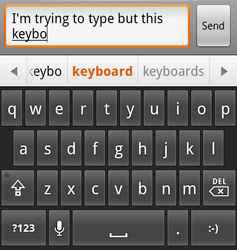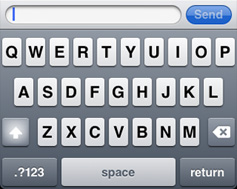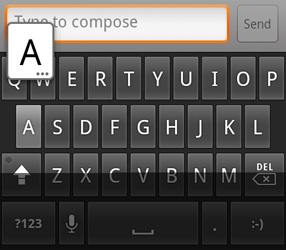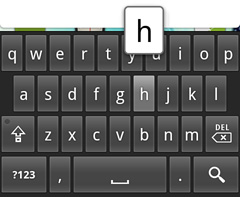Anand's Google Nexus One Review
by Anand Lal Shimpi on April 3, 2010 3:40 AM EST- Posted in
- Smartphones
- Mobile
The Keyboard: Form Factor vs. Speed
I was a Blackberry user for years before the iPhone. While I appreciated the look and feel of Windows Mobile devices nothing could ever replace the functionality of my Blackberry at the time. One trend I noticed however was with every new generation of Blackberry, the form factor got smaller and the keyboard became just slightly less usable. As Blackberries got narrower, the key spacing dropped and my peak typing speed dropped a bit. It never fell too much, but it was an annoyingly consistent trend. I was always fine upgrading because the newer phones usually had enough going for them that I was willing to make the sacrifice.
Using the Nexus One’s keyboard, I was reminded of the same feeling. While it’s a purely virtual keyboard, the key spacing isn’t quite as wide as the iPhone’s because the device is just slightly narrower. As a result, I can’t type as fast on the Nexus as I can on the iPhone. With a good amount of practice it’s possible to be quick on the keyboard. Using the keyboard in landscape mode was a lot more comfortable to me, unfortunately there’s hardly any remaining screen real estate when you do so.
The narrower keyboard is a side effect of the narrower device, which does make holding it up to your head to make a phone call more natural feeling than most smartphones, the iPhone included. It’s very difficult trying to strike a balance between smartphone perfection and comfort. Dell’s upcoming Mini 5 has an incredibly useful 5" screen, but it comes at the expense of not being very pocketable.
The Nexus One's keyboard is also missing multitouch support, which is something that the iPhone's keyboard originally lacked as well. This is mainly an issue if you're just transitioning from a physical keyboard and are used to having one key pressed as you're selecting the next key on the keyboard. I struggled with the lack of multitouch on the iPhone keyboard initially but by the time Apple added it in, I'd gotten used to not having it.
|
Google Nexus One
|
Apple iPhone 3GS
|
 |
 |
Like most smartphones, the Nexus One will attempt to autocorrect your spelling mistakes as you make them. By default there’s a bar of words that appears under your text input box as you type. The spelling correction appears to be based on length of word and letters used, but not the location of those keys on the keyboard. For example, typing yjomh instead of thong won’t autocorrect, although on the iPhone it will. Overall the autocorrection and thus typing on the iPhone is better than on the Nexus One. With the iPhone you can really just type and mostly forget about mistakes (assuming you take the one finger, one thumb, two thumbs approach and really grow accustomed to the device over about a week). The Nexus One comes close, but it still ends up feeling like it’s using a dated form of text entry/correction compared to the iPhone.
This is a major issue because with any device this narrow, the pad of just one of your thumbs will cover up a huge section of the keyboard. You can either slowly peck at it or rely on the phone to be as smart as possible in figuring out what you’re typing. Apple simply does this better.
 |
 |
There are other slight differences between Google and Apple’s virtual keyboards. Both magnify the key you’re pressing, but Apple connects the magnified key to the actual key you’re pressing - it’s a slight UI addition that does make it look nicer. Google does a better job of indicating that there are alternate versions of a letter by putting an ellipses after any key this applies to.










95 Comments
View All Comments
xtremevarun - Saturday, April 3, 2010 - link
Reviews of Nexus One on other sites were not as comprehensive as on Anandtech. You guys really explored all the features. Apple needs to do a major refresh to iPhone. And I do see Android becoming a major, major OS for phones if it's not already. WinMo7 also looks great. Good that competition is hotting up against the iPhone.xxNIBxx - Saturday, April 3, 2010 - link
What about Samsung's Bada OS? Samsung Wave s8500 beats the living crap out of all those Snapdragon devices. Also Samsung will release i9000 Galaxy S, which has pretty much the same hardware as with s8500, except it runs Android. Hardware wise, these 2 are the best phones in the world. Snapdragon is old news.Iphone 4g, which will come out in 2 months, will most likely use apple's a4, which from what i hear, is probably identical to samsung's 1ghz cpu(same cpu/gpu)/
sprockkets - Saturday, April 3, 2010 - link
If you receive a call over BT, does it1. Play the ringtone over the headset?
2. Play it on the headset only or both the speaker and headset?
3. Announce CID over the headset or even just the speaker?
sushantsharma - Saturday, April 3, 2010 - link
Looks OK! But usability should not go for a toss! Or I am missing it and it is there?Chloiber - Saturday, April 3, 2010 - link
"It's got a Qualcomm Snapdragon QSD8650 SoC"Thought the Nexus One (and the HTC Desire) use a Snapdragon QSD8250?!
Anand Lal Shimpi - Saturday, April 3, 2010 - link
You are correct :) Fixed!Take care,
Anand
Karl Brown - Saturday, April 3, 2010 - link
I will be receiving my Sony X10 on Tuesday.I hope the Sony will offer enough of the Nexus One's functionality to not make me regret not waiting longer for the Nexus One to become available in the UK.
jasperjones - Saturday, April 3, 2010 - link
Thanks for the very thorough review. The one area were the review lacks depth is audio and video playback and syncing. Differences in this area are striking imo:1.) If you don't use iTunes as an iPhone owner, you're pretty much SOL. The Nexus One I could sync with iTunes using DoubleTwist. But I don't like iTunes. I can just use Explorer or Windows Media Player or Songbird (1.7 beta) to sync instead. The latest Songbird builds do an amazing job (they even converts WAV and FLAC files on-the-fly).
2.) Formats. I like that the the Nexus One supports OGG. FLAC support is coming (AFAIK it got added to trunk some time ago--idk if users will see it in FroYo or Gingerbread) Plus the Nexus One gives me everything the iPhone has (including M4A).
3.) The media player. I hate to admit it as a current Nexus One and previous iPhone owner, but here the iPhone with its iPod app wins hands down. The UI of the iPod app is infinitely more intuitive, whereas things such as playlist generation are a pain on Android (everything takes far too many clicks).
Because of 3.), I think the overall win in this category goes to the iPhone.
bstewart - Saturday, April 3, 2010 - link
Outstanding review - really enjoyed your detailed assessment of the Nexus one compared to the IPone and Palm Pre. I have read a number of reviews on the Nexus one lately determining if it is the right device for me or not. After reading this review I am certainly more inclined to purchase it than before; especially based on it's pros and cons versus the IPhone. Thanks!Brian
cj100570 - Saturday, April 3, 2010 - link
All in all I'm not feeling this review. There was way to much time spent comparing the Nexus to the iPhone. And your complaints about the notification system used by Android is just asinine. I'm the former owner of both an original and 3G iPhone and Android simply puts the iPhone OS to shame. The iPhone had it's 15 minutes of fame but it's time to face facts that Apples way of doing things is the biggest problem the iPhone has. As a smartphone it is a #FAIL. Sure it sells well but the honest truth is that most people buy it because it's an Apple product and because of all the apps, 80% useless, that Apple and AT&T trot out as the big selling point.